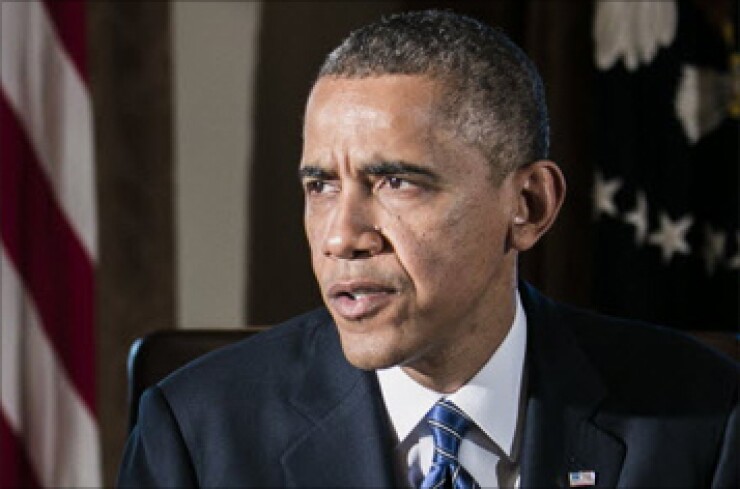
DALLAS — President Obama will veto a fiscal 2016 transportation funding bill unless lawmakers boost spending above the stagnant levels approved by the House Appropriations Committee in May, the Office of Management and Budget said on Tuesday.
The bill, H.R. 2577, which may be taken up by the House as soon as Wednesday, would provide $40.25 billion for highways and $10.7 billion for transit in fiscal 2016, down a total of $161 million from fiscal 2015 and almost $20 billion less than President Obama requested for transportation in his proposed fiscal 2016 budget.
"The administration strongly opposes the reductions in funding for surface transportation programs, which would essentially preclude new investments while freezing or reducing most major capital accounts below prior-year funding," OMB said in a Statement of Administration Policy. "If the President were presented with H.R. 2577, his senior advisors would recommend that he veto the bill."
OMB said a veto also would be recommended for "any other legislation that implements the current Republican budget framework, which blocks the investments needed for our economy to compete in the future."
President Obama's 2016 transportation proposal seeks $51.3 billion for highways and $18.2 billion for mass transit projects.
The administration's six-year, $478 billion Grow America Act, H.R. 2410, would provide $317 billion for highways, $114.6 billion for mass transit, and $28.8 billion for rail through fiscal 2021. It would be funded with $238 billion of revenue from a proposed mandatory tax on corporate foreign earnings and $239.3 billion of gasoline and diesel tax revenues.
OMB said the House committee's bill "freezes or cuts critical investment in transportation that creates jobs, helps to grow the economy, and improves America's roads, bridges, transit infrastructure, and aviation systems, benefiting towns and cities across the United States."
The appropriations bill was adopted by the House Appropriations Committee by a vote of 30-21 on May 13.
The House Rules Committee adopted a resolution Monday that set parameters for the floor debate on the transportation appropriations bill. The bill was put on the House calendar on Tuesday and congressional aides said it could be considered on Wednesday, though House Majority Leader Kevin McCarthy, R-Calif., had said it might have to wait until next week.
The OMB criticized the House bill for slashing the funding for two popular competitive grant programs that the president intended to increase significantly. It would reduce the Transportation Investment Generating Economic Recovery competitive grant program to $100 million in fiscal 2016, down from $500 million in fiscal 2015. This would be about 80% below the lowest level since the program began in fiscal 2009 as part of the stimulus effort, according to the OMB.
"This is despite the fact that the program is vastly oversubscribed due to strong state and local interest, supports some of the most transformative highway, port, and transit projects in the United States, and helps state and local partners leverage public and private dollars," OMB said.
The president's proposal called for a $1.25 billion TIGER program in 2016 and a total of $7.5 billion of the grants through fiscal 2021.
The House measure would allocate $1.9 billion for the Federal Transit Administration's Fast Start capital grant program next year rather than the $3.25 billion sought by President Obama.
The OMB also objected to a provision in the appropriations measure that would prohibit federal approval for segments of California's high-speed rail project until the state receives a permit for the entire route between Los Angeles and San Francisco, as well as a $50 million cut in next year's federal contribution to the Washington Metropolitan Area Transportation Authority.
Transportation Secretary Anthony Foxx criticized the bill in late April after it was approved by the appropriation committee's transportation panel. "We're not happy with the funding levels for sure," he said. "It's very disappointing overall because the country is sucking wind."





